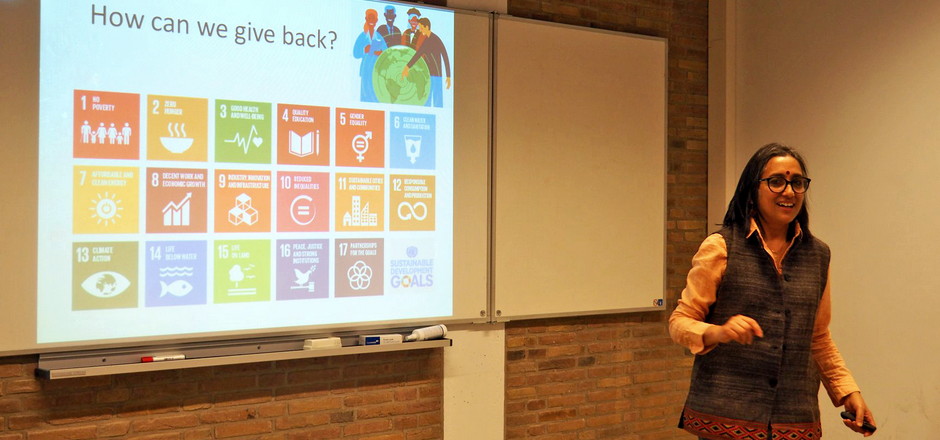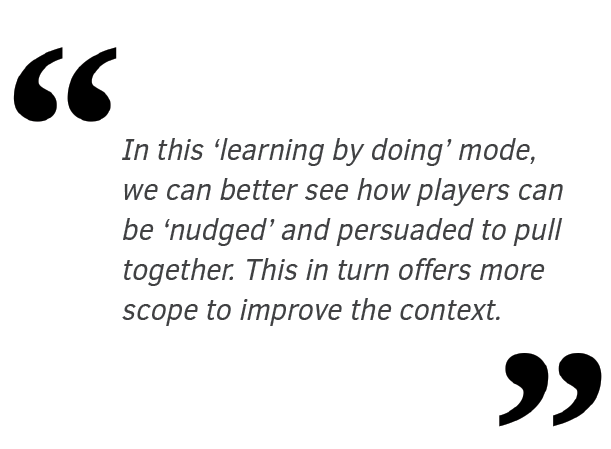
Governments worldwide have pledged to achieve the Sustainable Development Goals (SDGs) by 2030. But given the scale of the task, not even national governments can manage alone. This has sparked a new phenomenon: whereby non-governmental players – from start-ups to social enterprises to multinationals – are aligning strategies and working toward the same sustainable ends.
This new reality is also an opportunity to study how these supposedly ‘selfish’ players can be corralled for the common good. For social scientists, there are normally two ways to go about this. The well-trodden path means being an ‘outside thinker-observer-researcher’ – creating knowledge, while leaving the ‘object of study’ more or less untouched. The road less travelled means being an actor-participant: becoming a fellow mouse in the lab. In this ‘learning by doing’ mode, we can better see how players can be ‘nudged’ and persuaded to pull together. This in turn offers more scope to improve the context.
An action-research adventure on the road less travelled, Site4Society (S4S) aims to foster home-grown social innovation. It starts from the premise that knowledge need not be cold or aloof, but can in fact serve various social challenges. In the case of S4S, we address the clear lack of networks between academics from different disciplines and between social scientists and the rest of the world – on the SDGs in particular. So the main aim is to break open silos and start unconventional conversations through interactive workshops.
 For our second S4S event we hosted speakers from across the local innovation system, including Brightlands (an institution supported by the Limburg government to nurture start-ups), sustainably.io (getting to be a start-up), DSM corporate sustainability division (a Dutch multinational present in 50 countries), GoodGood (a social enterprise), LOCOtuinen (a cooperative), Bandito Espresso (a social enterprise) and Maastricht University (an academic institution!). How they are working to contribute to the SDGs is shown below.
For our second S4S event we hosted speakers from across the local innovation system, including Brightlands (an institution supported by the Limburg government to nurture start-ups), sustainably.io (getting to be a start-up), DSM corporate sustainability division (a Dutch multinational present in 50 countries), GoodGood (a social enterprise), LOCOtuinen (a cooperative), Bandito Espresso (a social enterprise) and Maastricht University (an academic institution!). How they are working to contribute to the SDGs is shown below.
-
EVENT IMAGES
| Speaker and company | How do they help governments achieve the SDGs? |
| Dr. Irina Burlacu, Programme Coordinator at Brightlands Innovation Factory | Building an Eco-system in the Limburg region and supporting start-ups working on SDGs. |
| Dr. Burak Can, Co-Founder of sustainably.io | Creating an open source platform offering an air quality solution on Internet of Things (IoT) – that minimises end of life waste and generates livelihoods for the differently abled. |
| Ms. Willemijn Brouwer, Sustainability Engagement Officer – Royal DSM | Leveraging unique competences in life sciences and material sciences towards solution designs that nourish performance and contribute to sustainability. |
| Dr. Kaiser Chaudhary, Founder of GreenIndusTree, GoodGoodVentures, and Power One for One | Channelling investment from for-profit companies into renewable energy in Emerging countries including the base of income pyramid markets via an Impact Investment platform. |
| Ms. Anne, Core team member of LOCOtuinen and responsible for communications | Running a cooperative urban garden where members can harvest their vegetables nine months per year and thereby decreasing carbon, promoting healthy food and raising awareness about sustainability. |
| Ms. Diënne Hoofs, Co-owner of Bandito Espresso | Providing good food and even better coffee using organic ingredients that have fair trade certification, with used equipment whenever possible for production and hosting clientele. |
| Mr. Jerôme Scheren, MPP Student, who mapped contributions of Maastricht University to the SDGs | Through scientific publications, collaboration with private actors and projects for public sector agencies and government bodies, Maastricht University contributes to SDGs. |
The trigger for all of the entrepreneurs was a deep desire to make the world better; it really had nothing to do with sighting a business opportunity.
| Entrepreneur | Personal triggers |
| Burak Can | Visible Impact of poor air quality on health of personal entourage |
| Kaiser Chaudhary | Desire to contribute to universal access to Clean Air, Clean Water and Clean Food |
| Anne | Desire to be engaged in more responsible, local production and consumption patterns. |
| Diënne Hoofs | Desire to provide an alternative food choice that is more organic and responsible |
The business models of the entrepreneurs were diverse and they came with their own challenges.
| Entrepreneur | Business model | Personal or systemic challenges |
| Burak Can | Entrepreneurs hold one steady job and devote spare time to firm | Time management – additional allocation of effort required for business take-off |
| Kaiser Chaudhary | A for-profit division funds a non-profit philanthropy (which may or may not be financially autonomous in the short or medium run) | Lack of interest of business intermediaries in Emerging markets in quality and long-time project sustainability |
| Anne | Business objective is to cover costs through cost-sharing by members and sales of organic produce | Lack of time of members to expand the community |
| Diënne Hoofs | Business objective is to generate livelihoods for workers while adhering to the credo of fair-trade and organic inputs. | Challenges of organic farmers in terms of access to information, logistics, activist buyers and a more open market. |
All of the speakers confirmed the possibility of furthering collaboration with the academic community and offered us great food for thought.
| Speaker | Questions / Message for students and academics |
| Irina Burlacu | Do you have a good business idea to promote sustainability? Contact us. |
| Burak Can | How can production systems be transformed to become circular or with zero waste? |
| Willemijn Brouwer | Help us in embedding the SDG agenda by examining our objectives, measuring impact and avoiding silos. |
| Kaiser Chaudhary | What does impact mean? What are socially adequate returns? Do countries care about SDGs or are they using it opportunistically? How much do developing countries care about the environment (e.g. in terms of willingness to invest effort and funds)? Do rules to which companies are bound to in Europe also apply to them in developing countries (PET, Fertiliser etc.)? How do multinationals respond to more lenient or ineffective regulatory systems? |
| Anne | How can we expand civil society communities that are engaged in urban farming? Let us take Maastricht as the case study. |
| Diënne Hoofs | Organic: is it really better for the environment? Fairtrade: is it really fair? How fair is fair trade? How can the downside of organic farming be addressed? Organic farming or Innovative farming? What should a small business do and not do to have the most positive impact possible? |
To conclude, I’d like to cite two doctoral students. For Chandrashekar, the presentations broke the standard economics notion that firms are uniquely focused on maximising profit. Instead, the speakers “highlighted not only economic, but also legal, philanthropic and ethical responsibilities”. For his part, PhD fellow Chuks Otioma said: “by bringing academics, students and practitioners together into the same room, SITE4Society offers a real two-way opportunity for learning and perhaps even partnership.”




